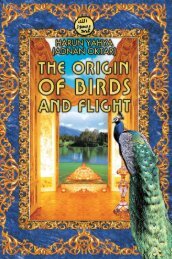Islam, the Qur'an and the Arabic Literature
Islam, the Qur'an and the Arabic Literature
Islam, the Qur'an and the Arabic Literature
Create successful ePaper yourself
Turn your PDF publications into a flip-book with our unique Google optimized e-Paper software.
plays in his faith. Embracing <strong>Islam</strong>, <strong>the</strong>refore, entails exposure to, <strong>and</strong><br />
familiarity with, <strong>the</strong> <strong>Arabic</strong> language. Such familiarity is necessitated by <strong>the</strong><br />
fact that memorization <strong>and</strong> recitation of Qur’anic verses in <strong>the</strong>ir original<br />
language is necessary for <strong>the</strong> performance of <strong>the</strong> daily rituals. O<strong>the</strong>r holy<br />
books may have had an impact on <strong>the</strong> languages in which <strong>the</strong>y originally<br />
appeared, but <strong>the</strong> impact that <strong>Islam</strong> <strong>and</strong> <strong>the</strong> Qur’an have had on <strong>Arabic</strong><br />
appears to be unique in its extent <strong>and</strong> durability. It has often been <strong>the</strong> case<br />
that a holy book appears in a given language <strong>and</strong> is <strong>the</strong>n translated into o<strong>the</strong>r<br />
languages, in which it continues to be read <strong>and</strong> recited during <strong>the</strong><br />
performance of rituals, but, in <strong>the</strong> case of <strong>the</strong> Qur’an, although it has been<br />
translated into many languages, <strong>the</strong>se translations cannot replace <strong>the</strong> original<br />
language as a language of worship, which continues to be <strong>Arabic</strong> for all<br />
Muslims, native speakers <strong>and</strong> o<strong>the</strong>rs.<br />
O<strong>the</strong>r holy books also came to be associated with specific languages, such as<br />
<strong>the</strong> Torah with Hebrew, <strong>and</strong>, perhaps less intimately, <strong>the</strong> New Testament with<br />
Greek <strong>and</strong> Latin. However, <strong>the</strong> nature of <strong>the</strong> relationship between <strong>the</strong> Qur’an<br />
<strong>and</strong> <strong>Arabic</strong> is still unique for reasons to be given below.<br />
The Qur’an: Muhammad’s strongest argument<br />
It has often been argued that <strong>the</strong> Qur’an is not only <strong>the</strong> first book, <strong>and</strong> <strong>the</strong><br />
highest linguistic achievement, of <strong>the</strong> <strong>Arabic</strong> language, but that it is also<br />
Muhammad’s strongest argument against those who doubted his Message.<br />
The question that needs to be addressed here concerns <strong>the</strong> reason why a<br />
holy book, a composition of language, should be hailed as <strong>Islam</strong>’s (<strong>and</strong><br />
Muhammad’s) strongest argument. [4] The point has sometimes been made<br />
that o<strong>the</strong>r prophets had more tangible miracles. In <strong>the</strong> case of Muhammad,<br />
however, <strong>the</strong> miracle was not comparable to Moses’ staff or Christ’s healing<br />
powers, but was simply <strong>the</strong> expression in language of <strong>the</strong> Qur’an.<br />
To underst<strong>and</strong> why Muhammad’s strongest argument or miracle was a book,<br />
<strong>the</strong> Holy Qur’an, it is necessary to underst<strong>and</strong> <strong>the</strong> role language <strong>and</strong> linguistic<br />
composition played in <strong>the</strong> lives of <strong>the</strong> pre-<strong>Islam</strong>ic Arabs. It is also important to<br />
underst<strong>and</strong> <strong>the</strong> nature of <strong>the</strong> <strong>Arabic</strong> language itself during <strong>the</strong> pre-<strong>Islam</strong>ic<br />
period. This underst<strong>and</strong>ing will help to show why <strong>the</strong> revelation of <strong>the</strong> Qur’an<br />
through Muhammad found attentive ears among his contemporaries, who not<br />
only were articulate users of <strong>the</strong> language but held those skilled in <strong>the</strong> arts of<br />
linguistic composition in high esteem. [5]<br />
The role played by language in pre-<strong>Islam</strong>ic Arabia<br />
Before <strong>the</strong> rise of <strong>Islam</strong>, <strong>Arabic</strong> was mainly a spoken language with an oral<br />
literature of elaborate poetry <strong>and</strong>, to a lesser extent, prose. [6] Writing had not<br />
yet fully developed <strong>and</strong> memorization was <strong>the</strong> most common means of<br />
preserving <strong>the</strong> literature. [7] Both poetry <strong>and</strong> prose in <strong>the</strong> pre-<strong>Islam</strong>ic era dealt<br />
with a ra<strong>the</strong>r limited range of topics which included in <strong>the</strong> case of poetry<br />
praise, eulogy (panegyric), defamation, <strong>and</strong> love, <strong>and</strong> in <strong>the</strong> case of prose<br />
superstition, legends, parables, <strong>and</strong> wisdom tales. [8]<br />
2




